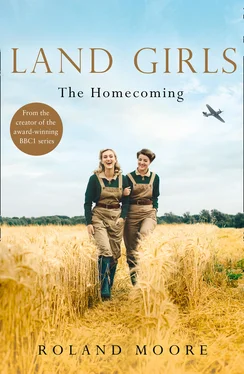“Come on, Lore, pull your weight,” Connie said.
“I’m finding it’s hurting my back,” Dolores admitted.
“You need to get your shoulder behind it,” Joyce offered. “Then it won’t hurt your back. Lift from the knees.”
“Really? How do you know all that?”
“Painful experience,” Connie replied. “We’ve shovelled more sh-”
“She’s right,” Joyce chipped in.
Dolores reluctantly put her shovel back into use, cutting through the rich manure and transferring a load to the cart nearby. She was a prickly woman, hard to engage in conversation and quite shut off from opening herself and her feelings up. It wasn’t that she judged the other women, just that she had no real desire to interact with them. This seemed odd. A strange way in which to make the time fly by at Pasture Farm. Joyce thought that this would make her war a lonely experience, so she and Connie had taken bets about who could get Dolores to open up the most. They’d both repeatedly tried different gambits, from Connie trying to find out her favourite dessert to Joyce talking about her husband in the hope that Dolores would share something of her private life. As it was they didn’t know what her favourite dessert was (“I don’t mind really”) and they didn’t know whether she was married or not (“It’s nice that your John has left the RAF and is out of danger”). She was a very private person. The facts they did know were scant: Dolores had arrived on Pasture Farm a month ago from Reigate in Surrey (although she was from Dublin originally). Before being conscripted as a Land Girl she’d been working at the American airbase at Redhill as a nurse. And it was her experience as a nurse that was why she ended up at Helmstead as the Land Girls often had to take shifts at the military hospital at Hoxley Manor on the estate. Dolores’s experience meant that she was given the position of ward sister when she did a shift there. It also meant that Connie and Joyce would have to take orders from her at Hoxley Manor: something that Connie, in particular, resented as Dolores would become very judgemental. She knew best when it came to nursing and she wasn’t afraid to show it.
As they dug the manure, Connie winked at Joyce. To pass the time, she was going to try another gambit to find out more about Dolores.
“What’s your favourite colour, Joyce?” Connie asked.
Joyce saw where this was going and replied, “Yellow is nice.”
“Dolores?” Connie asked. Surely this couldn’t fail? Something as innocuous as a colour. But it wasn’t to be.
“I don’t know really. They’re all nice.”
“But you must have a favourite.”
“Not really. I haven’t thought about it.”
“Well what colour’s your bedroom back home, then?”
Joyce could hardly contain her smile at how Connie had managed to get the conversation onto something quite personal from such unpromising beginnings. But maybe Dolores noticed the smile, because she clammed up even more than usual, portcullis defences coming down.
“What a strange question,” Dolores muttered, continuing with her digging. “Why are there so many roots down here?”
Connie looked at Joyce and the two women shared a small shrug. Good try, Connie, but that one didn’t work either.
“That’s another penny you owe me,” Joyce whispered, returning to work.
“I’m going to be broke at this rate,” Connie grumbled.
Henry checked his watch. He had fifteen minutes before he was due in church for the christening. He calculated he could stay here for another five minutes before he had to rush back to the vicarage to prepare everything. It was annoying that Connie wasn’t at the vicarage to put things in order. But he knew she had her duties as a Land Girl. However, there was a nagging feeling that even if that work didn’t exist, would she be there helping him? He put the thought out of his head and stared at the trap.
He had just five more minutes to catch a rabbit. It had taken him ages to tie the knot. As fumbled attempt built on fumbled attempt, Finch had waited with glee for the vicar to let loose with a swear word. But like Connie and Joyce waiting for Dolores to say something personal, he’d been disappointed. Henry had kept his cool and eventually managed to tie it.
Now, he was lying in some heather in a wooded area of the farm. Finch was beside him. Henry was holding one end of the twine; the other was fashioned into a loop twenty feet away near a tree. Henry was waiting for a rabbit to hop over and put its foot in the loop. Then he’d pull his end, closing the loop and trapping the rabbit.
“Isn’t there an easier way?” Henry whispered.
“All good things take time,” Finch offered, sagely.
“You didn’t think that when you made that carrot whisky. It was horrible,” Henry retorted.
“I had overwhelming supply demands so I had to rush that. This is different. Nature has its own pace.”
“But we haven’t seen a single rabbit.”
“Maybe it’s because you keep talking, Reverend.”
“I don’t keep talking.”
“Well, what are you doing now, then, eh?” Finch chuckled.
Henry shook his head. He was cold and the front of his body felt decidedly damp from lying in the heather for so long. He knew he wasn’t going to catch a rabbit today.
That evening, Connie walked back to the vicarage. As usual, her muscles were aching and she had blisters on her hands. She was looking forward to supper with Henry and an early night. And hoping that they could just have a nice time. But then she remembered that Henry would be late back. He was visiting an elderly French man who lived in a cottage on the edges of the Gorley Woods. Dr Beauchamp was dying and liked Henry to visit him to give him strength and comfort during his final days. And the conscientious young vicar felt obliged, even happy, to do his duty. Connie knew that Dr Beauchamp liked to talk, at as much length as his breathing problems would allow, about how his country was now occupied by the Germans and about how proud he was of his own son, who was fighting for the resistance there. So Henry wouldn’t be back until late.
Connie resigned herself to the mixed emotions of facing an evening alone. There would be no more disagreements or friction, but she’d miss him. As she approached the porch, she was surprised to find a visitor waiting on the doorstep of the vicarage. It was Roger Curran, the reporter from The Helmstead Herald . He tipped the small trilby on his head at her. Connie wasn’t sure if it really was a small hat or that it just looked small on his large head. He smiled warmly at her.
“Mrs Jameson! I have the most splendid news.”
“Oh yeah? What’s that, then?”
“Do you know? I’ve often heard that vicar’s wives make the very best tea.”
“I wouldn’t bank on it,” Connie said under her breath. But with nothing more pressing to do, she invited the journalist inside, slopped water into the kettle and put it on the stove.
The two of them were soon sitting around the dining table and Roger Curran’s podgy fingers were taking a second biscuit from the plate Connie had provided. He sipped at his tea and winced slightly. Connie knew it wasn’t one of her best efforts, but she found making tea really unaccountably tricky. She had made Roger Curran a ‘milky horror’ (as she liked to call it), with too much milk and too little tea. She guessed that he might revise his patter about vicar’s wives making the best tea from now on as he sipped it with a grimace.
“I’ll come straight to the point, Mrs Jameson,” he said, wiping a crumb from his lips. “It seems my little story has been picked up by one of the national newspapers.”
Connie looked surprised. She wasn’t sure whether she felt happy about that. “Well, can’t you stop them?”
Читать дальше












